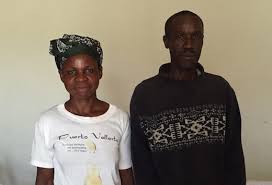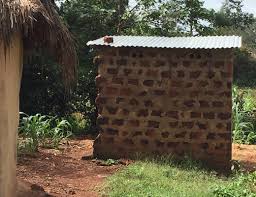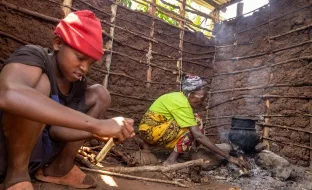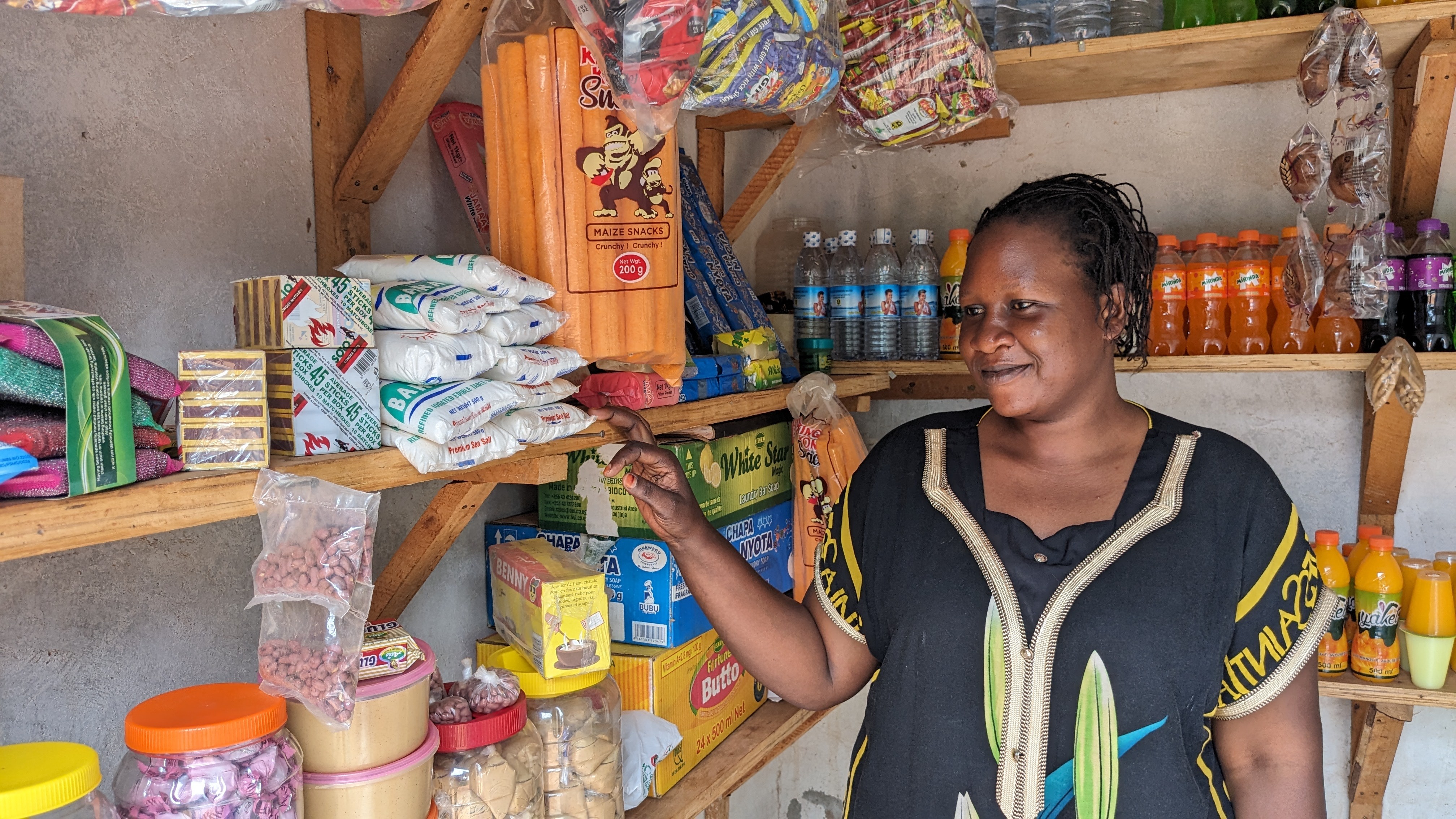Last month, I traveled to Kenya where I had the opportunity to speak with recipients who had received GiveDirectly cash transfers. After a long car ride from Kisumu to Siaya County, my colleague Cindy and I made it to the village where six randomly chosen GiveDirectly recipients lived. At the village center, Cindy, who speaks Luo and was able to translate these interviews, asked for directions, and we were told to walk a short way down the road.
Besides the one main, paved road, the villages I saw had small dirt paths that connect homesteads. The paths are unmarked and hard for outsiders to navigate. At first, I wondered how our field staff, who do speak the local language but are often unfamiliar with the areas where we work, find their way around. I found out that it’s a common practice for staff to pick up a local guide immediately upon arriving in the village. They then use satellite technology to tag each recipient household on a map so that follow-up teams can easily locate them on subsequent visits.
Cindy decided to ask someone from the first house we encountered by the side of the main road to be our guide for the day. Walking up a steep hill, from the road to the nearest house, we saw a middle-aged woman working with exposed stone on the side of the hill. In a surprising coincidence, Cindy quickly found out that the woman happened to be one of the recipients we were scheduled to meet.

Jane, the woman cutting stones, and her husband James, ages 35 and 40, live with their three children in a small iron-roofed house on the hillside, directly next to a road into the town center. The grass-thatched house they had previously lived in before receiving GiveDirectly’s transfer sits close to their larger, metal-roofed house and provides a visual before-and-after contrast of how their life changed.
At first, Jane warmly welcomed us into her home and it was just the three of us speaking; halfway through James joined us. Below are excerpts from a half-hour long conversation between me, James, Jane, and Cindy. Cindy translated Jane and James’s answers from Luo to English.
What did you spend your transfers on?
Jane: The first transfer I used to build a toilet, because I didn’t have one. The second transfer I used to cut down a tree, get some wood from it, and then I bought a few iron sheets. With the third transfer I bought sand and 59 sheets, and then I built this house. The walls are a mixture; inside it’s mud and then outside I used sand.

How have the transfers changed your daily life?
Jane: I am in a good house now. I am sure I will not be rained on at night, or when it is raining at any given time. I really appreciate that GiveDirectly came in and helped me when I really needed the help.
When I was in the other house, I had a daughter going to school, who was in form four. It’s that transfer – the same transfer I used to clear the school fees. Because of the school fees, I never had a chance to cement the floor. I wanted to pay the fees, and clear them, so that when my daughter grows up, maybe she can help me in the future.
Every day when I go to church, I give out a testimony to others to let them know how my life has changed and the steps I’ve taken because of GiveDirectly.
[James enters] How do you make money? And has the transfer improved your income?
Jane: The place where you found me outside, working with the stones, I do that daily. When somebody comes by with a lorry, or a wheelbarrow, I sell them. That’s how I manage to get something to eat.
James: I appreciate how my life has changed because I was able to get this house. Since I chose my wife as the main recipient, I really appreciate that my wife never misused the money. We came to the table together and managed the money together, such that we are now able to see that something good came out of it.
Is there a reason why you chose Jane to be the recipient?
James: I trust my wife to be more responsible because I didn’t believe so much in myself. I see most men are not good at managing money. Around here they misuse it a lot. So I saw that I could be influenced by that. I wanted my wife to be in the position to control everything. And I really appreciate that my wife did a good job with it. Because at first we were having a lot of arguments about whether to get a motorbike or a cow or build a house. But my wife made a good decision – to build the house.
Did you recognize before that your house was a big problem that needed to be fixed?
James: We saw our house was small and we had children. And it was grass-thatched. Getting grass thatch around here is sort of expensive. Because before it’s cut, you buy it at 2,000 KES [$20], from the person who cuts it, and then there’s transport. It’s sort of expensive. And you have to do it every now and then. You have to get grass every time rain comes. We saw that it was a very expensive and tiresome job. That’s why we decided to get an iron-roofed house. We saw that we really needed a house more than anything.
After the transfer, how did you see your future opportunities?
James: The money I used to use to purchase grass – right now I’m about to use it to buy good meals, like maize and wheat. I’m in a position to even buy chickens. I sell them out. I’m in a position to sell some of them to the extent that I was able to buy one cow. I have a cow in the homestead. I see that as time goes by, I’ll be able to buy more and more.
Can you speak to how GiveDirectly changed your life, or the lives of people in village?
Jane/James: We really appreciate the work GiveDirectly did. Around the village, a number of people used it well. The houses around the village are now looking good. They cannot be compared to previous houses before GiveDirectly came. For those who had wives, and had not paid their dowry, they were in a position to pay their dowry, now they have their wives for themselves and they really appreciate that.
For those who are giving now, please keep having the heart to give. For those who are in other places, know that this is a good thing.
Has there been any conflict between people who received the transfer and people who did not receive it?
James: There has not been any conflict around. Now the problem that has been here, is mostly when GiveDirectly takes too long to come back. They think, maybe we’ve been dropped, or something of the sort. And they start saying, maybe we’ve been left out or something. But the people who’ve received do a good job consoling them and telling them, no you’ve not been left out, it’s only that GiveDirectly sees so many people, so they end up going to many places but they still come back. And it happens like that.
Is there anything else you’d like to say about GiveDirectly’s work, or to people in the US?
James: I really appreciate and thank the donors. Because at this stage where I am now with my family, I’m at a place where I can compare myself with others in the village and say now I also can speak out, I also can stand out in the village. I can say, I’m somebody in the village, my family is something in the village. And I really appreciate being lifted up from the grassroots to where I am.

